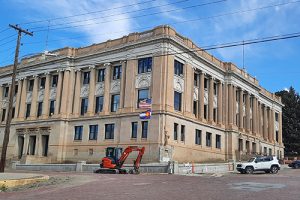The Railroad Strike of 1894 Ends on a High Note
by Sharon Niederman
RATON — Found deep within the vertical files of Arthur Johnson Memorial Library in Raton are numerous typewritten manuscripts of uncertain date and authorship. While the following account points to Miss Evelyn Shuler, the town’s first librarian, as the author, we cannot be certain of that. At any rate, an intelligent, literate, and caring person saw fit to record tales of Raton before they were completely forgotten. The following account details a chapter of Raton history concerning a little-known and very interesting aspect of the historic record: early labor struggles.
This dramatic account tells the story of an historic railway strike. The account has been edited for brevity.
“Largely dependent upon organized labor for her population, Raton has had her full share of labor troubles. A memorable disturbance was the A.R.U. (American Railway Union) strike of 1894. At this time, a number of the large railway systems, including the Santa Fe were in the hands of a receiver under the jurisdiction of federal courts and the Pullman car shop strike in Chicago had reached a most serious stage. Raton’s ordeal through this trying period was a repetition of similar experiences in hundreds of other railroad towns where men of the labor unions joined the A.R.U. and quit work as a sympathetic move in support of the Pullman strike.
“From June 26 until July 5, a period of eight days, not a car wheel turns in the local yards. So complete was the tie up that eight Pullman trails loaded with passengers made Raton their enforced stopping place until traffic could be resumed under federal protection.
“For months, difficulties between organized railroad labor and the railroad companies had been milling for a show down.
When the set date, June 26, arrived, the local atmosphere was surcharged with expectancy – for just what, no one seemed to know. Noon of that day passed, and a passenger train from the south pulled up to the Harvey House for a late dinner. A second Pullman from the north pulled in on the passing track a few minutes later and discharged its passengers for the dinner hour.
Just before the “all-aboard” came for the north-bound, a “yellow slip of paper fluttered down” the telegraph office window to a waiting switchman below. A signal was given and two A.R.U. switchmen broke the coupling between the rear Pullman and the next car. The expected order, sent simultaneously to every other division point in the United States had arrived. The train started, pulled up a few feet from its Pullman and stopped, there to remain for the duration of the tie up. Seven other passenger trains went through the same procedure during the next several hours.
As soon as the news was broadcast through the shops and yards, every man quit work, the large majority of them proceeding to the A.R.U. assembly hall in the Old Rink, then occupying the site on which the J.C. Penny store stood. There the men stood in line a block and a half long waiting their turn to enroll as members of the A.R.U. Many belonged to labor unions at this time, but the local membership of the A.R.U. had been small until the strike order.
Daily meetings were held by the striking forces in the Old Rink which was reported to the federal authorities as containing a large arsenal of rifles and ammunition. A force of 50 U.S. marshals was sent to Raton.
A mile stretch heavy grade on the mountain between the tunnel and Raton was “soaped” but discovered in time to prevent serious accident.
Realizing the terrible possibilities of the situation developing through the nation, President Cleveland invoked the use of federal troops. A company of 100 men from the Tenth U.S. Infantry stationed at Ft. Marcy in Santa Fe rolled into Raton on a special train at 6:30 on the evening of July 4. The company came up Clark Ave. to Second St and turned toward the Old Rink where the strikers were meeting.
Proceeded by the officer in command, the troops crowded through the narrow hallway into the auditorium before any member of the audience was aware of the presence of troops in the city. A wild scramble for the exits took pace.
After a thorough search, the only firearm found was an antiquated musket. After issuing a proclamation declaring martial law, the officer marched the troops to the vacant camping site east of the depot where a permanent military camp was maintained for the next several weeks. Normal train service was established during the next few days.
Several hundred passengers were marooned in Raton. They were fed at railroad expense at the Harvey House. Very few succeeded leaving the city because highway were little better than old wagon trails.
Among the perturbed but good natured visitors was a large opera troop headed by the well known actor of that day, John S. Murphy, then en route from Chicago for a season the the Pacific Coast. Like good sports, the company enlivened their enforced stay by giving their opera at the Old Rink stage.




